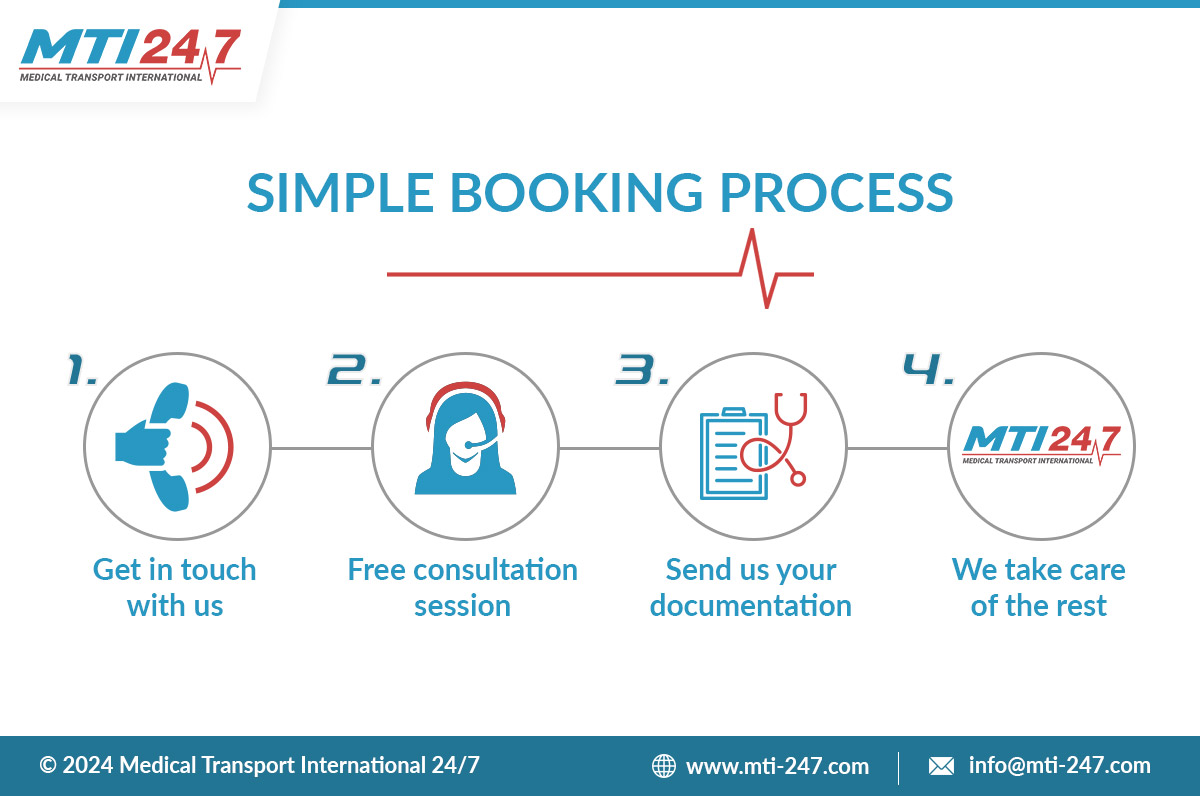Flying with kidney disease feels like your body's operating manual got lost in translation. Your creatinine levels are climbing, your energy crashes mid-afternoon, and now you need to cross continents. While healthy passengers worry about legroom and meal choices, you are calculating fluid restrictions against cabin pressure changes. The aviation industry was not designed for compromised kidneys; dry cabin air, altitude-induced dehydration, and limited bathroom access create a perfect storm of complications. Yet millions of kidney patients worldwide fly annually, most without incident. MTI 24/7 understands these unique challenges, providing kidney-focused medical flights and careful preparation guidance, helping you travel with confidence instead of constant worry.
Can kidney disease patients travel safely by air?
Most kidney patients can fly safely with proper medical clearance, especially those in stages 1 to 4 of chronic kidney disease (CKD).
Air travel creates unique risks such as dehydration, blood pressure changes, and medication disruptions due to altitude and dry cabin air.
Careful preparation is critical including hydration planning, medication scheduling, seat selection, and physician approval before travel.
Dialysis patients need special coordination to ensure access to treatment facilities or manage peritoneal dialysis supplies during the trip.
Advanced CKD may require medical transport such as air ambulances or medical escorts for safer travel with continuous care.
MTI 24/7 provides expert solutions including kidney-focused flight planning, air medical services, and professional travel support.
What is chronic kidney disease?
Chronic kidney disease transforms your body's natural filtration system into an increasingly unreliable partner. Unlike sudden kidney failure, CKD develops gradually over months or years, silently reducing your kidneys' ability to remove waste, balance fluids, and regulate blood pressure.
Your specific situation becomes decisive when air travel enters the equation:
Disease progression spans five stages: from mild kidney damage (Stage 1) to complete kidney failure requiring dialysis or transplant (Stage 5), with diabetic nephropathy, hypertension, and polycystic kidney disease as leading causes.
Over 850 million people worldwide live with CKD: affecting all ages but most commonly diagnosed in adults over 60, with higher rates among those with diabetes, high blood pressure, or family history.
Symptoms often remain hidden until advanced stages: fatigue, swelling, changes in urination, nausea, and difficulty concentrating may not appear until significant kidney function is already lost.
Treatment varies dramatically by stage: from lifestyle modifications and medications in early stages to dialysis schedules, dietary restrictions, and frequent medical monitoring in later phases.
Each of these factors directly impacts how your body responds to the unique stresses of air travel.

Can I fly with chronic kidney disease?
Most kidney patients can fly safely, but timing and preparation separate smooth journeys from medical emergencies. Your kidney function level, current symptoms, and treatment schedule create a unique risk profile that determines flight feasibility.
Several key factors determine whether you are cleared for takeoff:
Stable kidney function allows safe travel: patients in stages 1-4 with controlled symptoms, stable creatinine levels, and no recent hospitalizations typically receive medical clearance for commercial flights.
Active complications ground you temporarily: severe fluid retention, uncontrolled blood pressure, recent dialysis changes, or acute kidney injury require medical stabilization before any air travel.
Dialysis schedules need careful coordination: hemodialysis patients must arrange treatment at destination facilities, while peritoneal dialysis patients need sterile supplies and proper technique maintenance during travel.
Advanced CKD requires medical supervision: stage 5 patients or those with multiple complications benefit from medical escorts or dedicated air ambulance services rather than commercial flights.
Even with medical clearance, your kidneys face specific aviation-related challenges that healthy passengers never encounter.
What are the risks of flying with kidney disease?
Air travel creates a hostile environment for compromised kidneys, amplifying problems your body already struggles to manage. Commercial aircraft cabins operate at reduced atmospheric pressure equivalent to 6,000-8,000 feet altitude, while humidity drops to desert-like levels below 20%.
Your kidneys face multiple simultaneous stressors that healthy passengers barely notice:
Severe dehydration accelerates rapidly: dry cabin air increases fluid loss through breathing and skin, while reduced kidney function prevents proper fluid balance regulation, potentially triggering acute kidney injury.
Blood pressure fluctuations become dangerous: altitude changes and cabin pressure variations stress cardiovascular systems already compromised by CKD, risking hypertensive crises or dangerous drops in blood pressure.
Medication timing gets disrupted: crossing time zones complicates dosing schedules for blood pressure medications, diuretics, and other kidney-protective drugs, potentially destabilizing carefully managed treatment regimens.
Limited medical assistance at altitude: flight crews lack specialized kidney disease training, emergency medications may be insufficient, and diversion to ground-level medical care can take hours over oceans or remote areas.
These risks compound exponentially when combined with existing kidney damage, making preparation absolutely critical for safe travel.
How can I fly safely with kidney disease?
Smart preparation transforms risky kidney disease flights into manageable journeys for those cleared for commercial aviation. These strategies specifically target the physiological challenges your compromised kidneys face at altitude, while accounting for the limited medical resources available on standard passenger aircraft.
Essential precautions protect your kidney function throughout your journey:
Hydration requires precise calculation: drink 8oz of water per hour of flight time, but coordinate with your nephrologist to adjust for your specific fluid restrictions and avoid dangerous overload that damaged kidneys cannot process.
Medication management becomes mission-critical: pack double your required medications in carry-on luggage, maintain original prescription bottles for security, and create a detailed schedule accounting for time zone changes with your doctor's guidance.
Pre-flight medical clearance prevents mid-air crises: obtain written physician approval within 48 hours of departure, including current lab results, medication list, and emergency contact information for your nephrologist.
Strategic seat selection minimizes complications: choose aisle seats near restrooms for frequent bathroom access, avoid alcohol and excessive sodium from airline meals, and wear compression socks to prevent dangerous blood clots in compromised circulation.
These precautions only apply to stable kidney patients approved for regular commercial flights. More advanced cases require specialized medical transport solutions.
How do air ambulances help kidney disease patients?
MTI 24/7’s air ambulances transform flying from a medical gamble into a controlled therapeutic environment specifically designed for your kidney's needs. Unlike commercial flights where you are just another passenger hoping nothing goes wrong, our medical jets function as flying intensive care units with equipment and expertise tailored to manage kidney-related emergencies at altitude.
Our kidney-focused air ambulance service addresses every aspect of your medical transport:
Sea-level cabin pressure eliminates altitude stress: pressurized to ground level conditions, preventing fluid shifts and cardiovascular strain that damage compromised kidneys, while maintaining optimal oxygen levels for patients with anemia or breathing difficulties.
Specialized equipment monitors kidney function in real-time: onboard dialysis capabilities, advanced fluid management systems, continuous blood pressure monitoring, emergency medications for acute kidney injury, and cardiac monitoring for patients with kidney-related heart complications.
Expert medical crew trained in kidney disease management: flight physicians experienced in nephrology, critical care nurses familiar with dialysis procedures, paramedics equipped to handle fluid overload or electrolyte imbalances, and 24/7 ground support from kidney specialists.
Complete medical continuity during transport: bed-to-bed service eliminating dangerous transfers, direct IV medication administration, sterile dialysis procedures mid-flight, and swift medical intervention capability without waiting for emergency landings.
When commercial aviation poses too great a risk, our air ambulances provide the medical safety net that transforms impossible journeys into life-saving medical missions.
Is a medical escort a cost-effective option for kidney patients?
Medical escorts offer kidney patients the security of professional medical care on commercial flights at a fraction of air ambulance costs. This middle-ground solution provides trained medical supervision during regular passenger flights, making international kidney care accessible for patients who need more than self-management but do not require intensive care transport.
MTI 24/7's medical escort service bridges the gap between commercial flying risks and air ambulance expenses:
Professional medical supervision throughout your journey: qualified nurses or paramedics trained in kidney disease management accompany you on commercial flights, monitoring vital signs, managing medications, and responding to complications in a reactive way.
Cost-effective alternative to air ambulances: medical escorts provide essential medical oversight at reduced costs compared to dedicated air ambulance services, making specialized kidney care transport accessible for more patients.
Seamless integration with commercial aviation: our healthcare escorts handle airline medical clearance paperwork, coordinate with cabin crew for emergency situations, provide airport assistance and mobility support, assist with bathroom needs, and ensure proper medication timing across time zones.
Emergency response capability at altitude: trained to manage kidney-related crises including fluid overload, blood pressure emergencies, dialysis complications, and medication reactions, with direct communication to ground-based nephrologists for guidance
For stable kidney patients who need medical reassurance but do not require intensive care, our medical escorts deliver professional healthcare expertise at accessible prices.
Contact us to fly safely with kidney disease!
 Whether you need a fully equipped air ambulance, professional medical escort, or expert guidance for commercial flight preparation, MTI 24/7's kidney specialists understand exactly what your condition requires for safe travel. Contact our team. They will assess your travel needs, and recommend the safest, most appropriate transport solution for your journey.
Whether you need a fully equipped air ambulance, professional medical escort, or expert guidance for commercial flight preparation, MTI 24/7's kidney specialists understand exactly what your condition requires for safe travel. Contact our team. They will assess your travel needs, and recommend the safest, most appropriate transport solution for your journey.
Reach us by:
Phone: USA: +16468635532 / UK: +442036080959
Email: info@mti-247.com
Our contact form
:quality(75))
:quality(75))